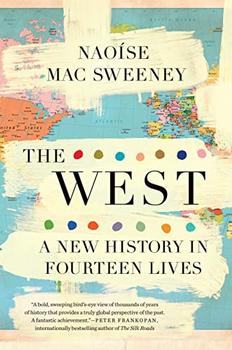Summary | Excerpt | Reviews | Beyond the Book | Readalikes | Genres & Themes | Author Bio

A New History in Fourteen Lives
by Naoíse Mac Sweeney
Given that its subject is an abstraction (albeit an extremely powerful and significant one), a book like this could easily get stuck in the realms of the theoretical. To avoid this, I have grounded my narrative in the lives of fourteen real historical figures. Some might be familiar names, others less so. But from the enslaved poet to the exiled emperor, and from the diplomatic monk to the beleaguered bureaucrat, their stories give a new shape to Western history. In each chapter, I offer not only the story of one remarkable human life, but also an account of the times and places in which each individual lived, setting them for context in relation to other important figures of their age.
The first half of the book addresses the historical inaccuracies of Western Civilisation as a grand narrative, debunking the fantasy of a pure and unbroken cultural line by examining its supposed origins. The first two lives within it come from the classical world that is assumed to be the birthplace of the West, and demonstrate that neither the ancient Greeks nor the Romans saw themselves as partaking in an exclusively Western or European identity (Chapters 1 and 2). The next three biographies come from the supposed "Dark Ages" of the medieval period, exemplifying how the Greek and Roman legacies were embraced, rejected and reimagined in its Islamic, central European and Byzantine contexts, respectively (Chapters 3, 4 and 5). The final two lives in this section take us to the Renaissance and the early modern period, where civilisational lines were drawn in various and conflicting ways – dividing the continent of Europe and the larger entity of Christendom in a manner that negates the notion of a coherent West (Chapters 6 and 7).
The second half of the book considers how Western Civilisation has functioned as an ideological tool and traces its emergence and development into the grand narrative that has become so familiar today. Within it, the first three chapters explore how changing ideas in the sixteenth and seventeenth centuries about religion and science, global expansion and imperialism, and the political contract contributed to the gradual emergence of the idea of Western Civilisation (Chapters 8, 9 and 10). The next pair of biographies captures how the idea of Western Civilisation developed into its mature form, providing an anchor for Western imperialism and pervasive systems of racial dominance (Chapters 11 and 12). The final pair of lives exemplify the two main challenges currently levelled at both the West and Western Civilisation – those of internal critics and external rivals – demonstrating the changing realities of the world we live in, and the urgent need for a wholesale rethinking of both the fundamental identity of the West and its origin myth of Western Civilisation (Chapters 13 and 14).
These fourteen lives are my equivalent of the bronze statues that so discomfited me in the Library of Congress. But unlike that particular set of imagined ancestors, the individuals whose lives I recount in this book have not been selected as the most important or influential people of their age. I make no claim in this book to present a "gallery of greats". Instead, my fourteen subjects are all people in whose lives and work we can see something of the zeitgeist; through whose experiences, actions and writings we can discern changing ideas about civilisational inheritance and imagined cultural genealogies. These are, of course, not the only lives I could have chosen to focus on in this book, and I am sure that you each would choose differently were you to embark on a similar project. They do nonetheless serve to make my point. They demonstrate that the grand narrative of Western Civilisation is both manifestly untrue and ideologically bankrupt. They illustrate, at the scale of the individual human, why we must jettison this grand narrative once and for all. And they suggest a richer and more diverse set of historical lineages in which we should seek a new version of Western history to replace it with.
Excerpted from The West by Naoíse Mac Sweeney. Copyright © 2023 by Naoíse Mac Sweeney. Excerpted by permission of Dutton. All rights reserved. No part of this excerpt may be reproduced or reprinted without permission in writing from the publisher.




A classic is a book that has never finished saying what it has to say
Click Here to find out who said this, as well as discovering other famous literary quotes!
Your guide toexceptional books
BookBrowse seeks out and recommends the best in contemporary fiction and nonfiction—books that not only engage and entertain but also deepen our understanding of ourselves and the world around us.